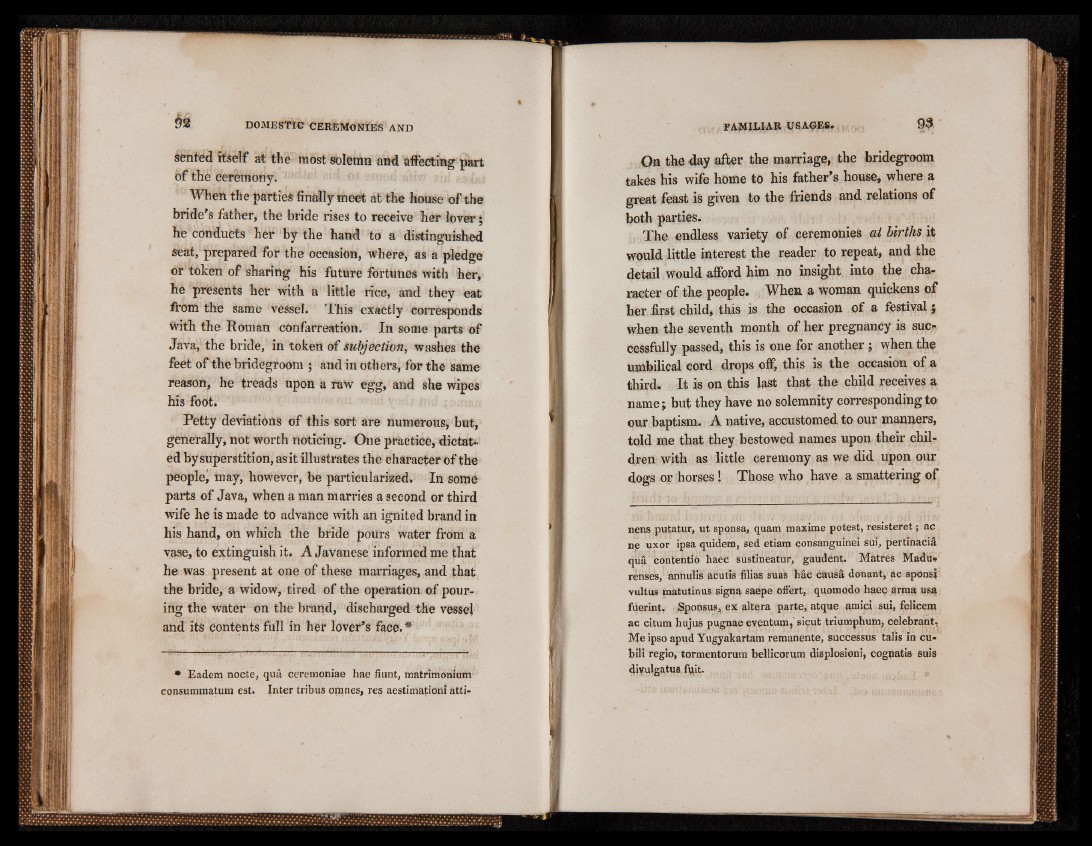
sented itself at the most solemn and affecting part
of the ceremony.
When the parties finally meet at the house of the
bride's father, the bride rises to receive her lover ;
he conducts her by the hand to a distinguished
seat, prepared for the occasion, where, as a pledge
or token of sharing his future fortunes with her,
he presents her with a little rice, and they eat
from the same vessel. This exactly corresponds
With the Roman cûnfarreation. In some parts of
Java, the bride, in token of Subjection, washes the
feet of the bridegroom ; and in others, for the same
reason, he treads upon a raw egg, and she wipes
his foot.
Petty deviations of this sort are numerous, but,
generally, not worth noticing. One practice, dictât*,
ed by superstition, as it illustrates the character of the
people^ may, however, be particularized. In some
parts of Java, when a man marries a second or third
wife he is made to advance with an ignited brand in
his hand, on which the bride pours water from a
vase, to extinguish it. A Javanese informed pie that
he was present at one of these marriages, and that
the bride, a widow, tired of the operation of pouring
the water on the brand, discharged the vessel
and its Contents full in her lover’s face.*
* Eadem nocte, qua ceremoniae hae fiunt, matrimonium
consummatum est. Inter tribus omnes, res aesdmationí atti-
On the day after the marriage, the bridegroom
takes his wife home to his father’s house, where a
great feast is given to the friends and relations of
both parties.
The endless variety of ceremonies at births it
would little interest the reader to repeat, and the
detail would afford him no insight into the character
of the people. , When a woman quickens of
her first child, this is the occasion of a festival;
when the seventh month of her pregnancy is sue*
cessfully passed, this is one for another; when the
umbilical cord drops off, this is the occasion of a
third. It is on this last that the child receives a
name; but they have no solemnity corresponding to
our baptism. A native, accustomed to our manners,
told me that they bestowed names upon their children
with as little ceremony as we did upon our
dogs or horses! Those who have a smattering of
nens putatur, ut spqnsa, quam maxime potest, resisteret ; ac
ne uxor ipsa quidem, sed etiam consanguinei sui, pertinacia
qua contendo haec sustineatur, gaudent. Matres Madu*
renses, anttulis acutis filias suas M e causa donant, ac sponsf
vultus matutinus signa saepe offert, quomodo haec arma usa
fiierint, Sponsus, ex altera parte, atque amici sui, felicem
ac citum hujus pugnae eventum, sicut triumphum, celebrant,
Me ipso apud Yugyakartam remanente, successus talis in cubili
regio, tormentorum bellicorum displosioni, cogpatis suis
divulgatus fpit.